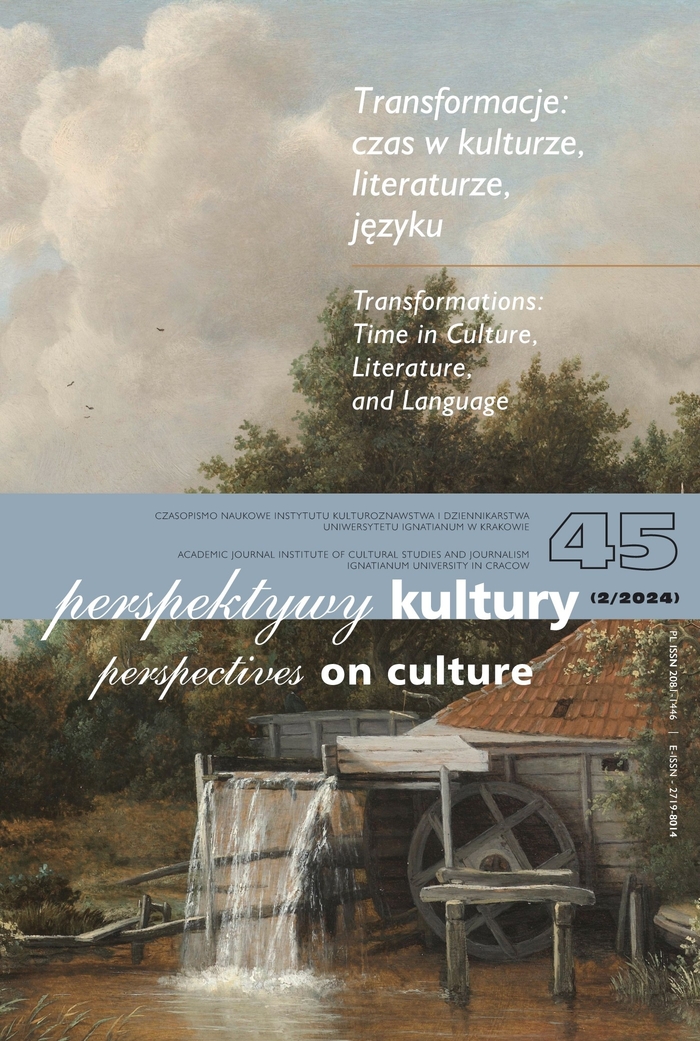Czas umów w Wyrzutku Josepha Conrada
Abstrakt
Artykuł bada temporalny aspekt umów międzyludzkich w powieści Josepha Conrada Wyrzutek oraz w nawiązaniu do tezy Johna M. Taggarta o nierealności czasu. Realizowanie kontraktów jest formą panowania nad czasem. Skoro jednak, jak głosił współczesny Conradowi brytyjski filozof John M. McTaggart w dziele Nierzeczywistość czasu, czas nie jest częścią realnego świata, to kontrakty zawierane między ludźmi również nie są rzeczywiste. Kontrakty handlowe, umowy cywilnoprawne, dżentelmeńskie i małżeńskie, choć dotyczą spraw bardzo ważnych i brzemiennych w skutki, są swoistą farsą właśnie ze względu na swój aspekt czasowy. Zawieranie sojuszy i branie na siebie odpowiedzialności za ich realizację okazuje się w świetle teorii McTaggarta działaniem nie tylko umownym, ale także niebezpiecznie ambiwalentnym.
Bibliografia
Bergson, H. (1910) Time and Free Will: An Essay on the Immediate Data of Consciousness. Trans. F. L. Pogson. London: Allen & Unwin.
Bernstein, J. A. (2012). “‘No Audible Tick’: Conrad, McTaggart, and the Revolt against Time.” The Conradian, vol. 37, no. 1, pp. 32–45. JSTOR, http://www.jstor.org/stable/23264493. Accessed 11. March 2023
Conrad, J. An Outcast of the Islands. (2016). Ed. Allan H. Simmons. The Cambridge Edition of the Works of Joseph Conrad. Cambridge: Cambridge University Press.
Davies, L. (2017). Introduction and Notes. [In:] Wells, H. G. The Time Machine and Other Works. Ware, UK: Wordsworth Editions.
Henderson, L. D. (1983). The Fourth Dimension and Non-Euclidean Geometry in Modern Art. Cambridge: The MIT Press.
Lothe, J. (1989). Conrad's Narrative Method. Oxford: Clarendon Press.
Martin, J. J. (1974). EDWARD GARNETT AND CONRAD’S RESHAPING OF TIME. Conradiana, 6(2), 89–105. http://www.jstor.org/stable/24641846 Accessed 11 March 2023
McTaggart, J.E. (1893). “Time and the Hegelian Dialectic”. Mind, 2(8): 490–504.
McTaggart, J.E. (1908). “The Unreality of Time”. Mind, 17(68): 457–474.
Najder, Z. (2007). Joseph Conrad: A Life. Translated by Halina Najder. New York: Camden.
Peters, J.G. (2000). Joseph Conrad’s “Sudden Holes” in Time: The Epistemology of Temporality. Studies in the Novel 32 (4), 420-441. http://www.jstor.org/stable/29533413 Accessed 11. March 2023
Throesch, E. L. (2017). Before Einstein: The Fourth Dimension in Fin-de-Siècle Literature and Culture. Anthem Nineteenth-Century Series. https://www.jstor.org/stable/j.ctt1jktqh1.4 Accessed 11. March 2023
Tooley, M. (ed.) (1999). Time and Causation. Analytical Metaphysics Series. New York&London: Garland Publishing Inc.
Copyright (c) 2024 Perspektywy Kultury

Utwór dostępny jest na licencji Creative Commons Uznanie autorstwa 4.0 Międzynarodowe.
Autor, zgłaszając swój artykuł, wyraża zgodę na korzystanie przez Wydawnictwo Uniwersystet Ignatianum z utworu na następujących polach eksploatacji:
- utrwalania utworu w formie papierowej, a także na nośniku cyfrowym lub magnetycznym;
- zwielokrotnienia utworu dowolną techniką, bez ograniczenia ilości wydań i liczby egzemplarzy;
- rozpowszechniania utworu i jego zwielokrotnionych egzemplarzy na jakimkolwiek nośniku, w tym wprowadzenia do obrotu, sprzedaży, użyczenia, najmu;
- wprowadzenia utworu do pamięci komputera;
- rozpowszechniania utworu w sieciach informatycznych, w tym w sieci Internet;
- publicznego wykonania, wystawienia, wyświetlenia, odtworzenia oraz nadawania i reemitowania, a także publicznego udostępniania utworu w taki sposób, aby każdy mógł mieć do niego dostęp w miejscu i czasie przez siebie wybranym.
Wydawca zobowiązuje się szanować osobiste prawa autorskie do utworu.






